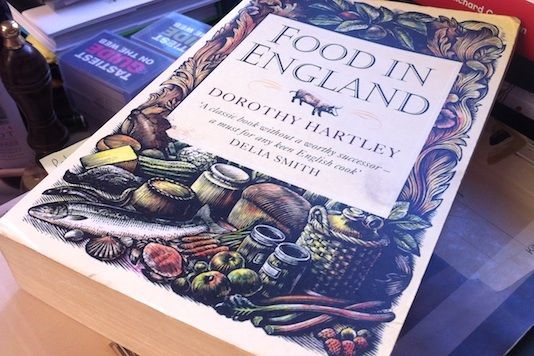
Got a book token for Christmas and not sure what to buy? Well you could do a lot worse than a copy of Dorothy Hartley's Food in England.
If I had to take one book about food to a desert island, it would be Dorothy Hartley’s Food in England. On publication one magazine declared "The woman who owns this book can throw away all the others." My 2006 copy has a line from Delia herself on the cover calling it "a classic book without a worthy successor". It really is that good.
A history of England all but gone
Written in the aftermath of World War II it describes in exquisite detail an England stretching from the Middle Ages to the middle of the twentieth century. Yet at the time of writing much of what is contained within its pages was in the process of being forgotten or ‘improved’. Hartley describes her work as "like an old-fashioned kitchen, not impressive but a warm, friendly place, where one can come in at any time and have a chat with the cook".
As the food writer Tim Hayward explains: "She was a social historian and, much like the folk music buffs who travelled the country 'collecting' tunes, she saw recipes as a branch of our national heritage and folklore to be respected, collected, understood and preserved."
The book contains sage advice on everything from poaching, to preserving, to building a privy. It is also a personal narrative from Hartley herself, as much of what she describes in her text is gleaned from her own personal experience.
About Dorothy Hartley

Drawings
As well as being a talented writer, Hartley was also a gifted illustrator and the book is flecked with little drawings and diagrams. Some are factual and informative, others simply enjoyable for their artistic merit, such as the cat lapping at a saucer of milk at the beginning of the chapter on dairy produce.
Legacy
Hartley (along with the likes of Florence White) found her work eclipsed by Elizabeth David, whose posthumous reputation has been distilled into ‘England was a misery-stricken hinterland lacking any warmth or taste until David showed us the sun-soaked joys of the Mediterranean’. She is described in hyperbole as ‘the woman who changed the way we eat’. She is the reason we eat red peppers in January, and that Mediterranean cooking has become the de-facto casual dining experience in the UK.
The thing is Hartley’s book isn’t all Scotch eggs, bloody beef and thick suet puddings (things which are all now en vogue once more). She described Indian and Arabic food in detail, and one of her recipes calls for soy sauce – and this is in 1954! David just had better PR it seems. "It's only now that Hartley is being rediscovered by a new generation, angry at industrialisation, angry at the commercialisation of food, sickened by food elitism and increasingly proud of rediscovering our food culture" adds Tim Hayward.
Food in England is a book I find myself turning to again and again, not for its factual content, though much of that is of interest, but for its warmth, humour and Englishness. As Hartley says in the introduction: "English cookery is old fashioned, because we like it that way".
Finally it seems the tide is changing regarding Hartley and the other English cookery writers. Lucy Worsley is working on a new documentary about Dorothy Hartley for BBC Four due out this year. It’ll no doubt be amazing and she’ll finally get the notoriety, adulation and respect I and others think she deserves. In the meantime put that book token to good use and get a copy of her book.
More bookish things
The cookery books chefs reach for